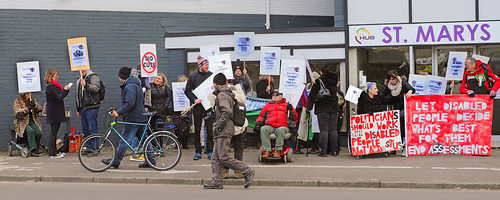New minister for disabled people will combine role with other duties
Minister for Disabled People #MinisterforDisabledPeople

By Chas GeigerPolitical reporter
The government will not appoint a new dedicated minister for disabled people, Downing Street has said.
It said the post, left vacant when Tom Pursglove became minister for legal migration, would be filled by an existing minister with other duties.
No 10 denied making two ministers responsible for migration but no one solely for disability issues amounted to “downgrading” that role.
Charities have described it as “appalling” and “retrograde”.
Disability groups had previously voiced concerns about over how long it might take to fill the job.
Pressed on the fact that the new minister would not have a specific disabilities brief, the prime minister’s official spokesman said: “What you will continue to see is a government showing strong support for disabled people and for disabled issues.”
The new person “who will lead on that important work” would come from the Department for Work and Pensions (DWP), he added. There is no indication when the role will be assigned to a minister.
Disability charity Sense said the job of minister for disabled people was “a vital role in government to ensure disabled people’s interests are represented” and should not be taken on by someone who was “already juggling other responsibilities”.
Another charity, Scope, condemned the change as “an appalling and retrograde move”.
Anastasia Berry, policy co-chair of the Disability Benefits Consortium, said: “Despite making up almost a quarter of the population, disabled people are yet again being treated like they don’t exist.”
Mr Pursglove was appointed minister for disabled people within the DWP when Rishi Sunak became prime minister in October 2022.
He left the role last week when Robert Jenrick resigned as immigration minister, arguing that Mr Sunak’s new Rwanda legislation did not go far enough, and his job was divided into two roles – one responsible for legal and the other for illegal migration.
Disability rights groups have been very critical of the government’s record on a number of issues.
In his Autumn Statement last month, Chancellor Jeremy Hunt announced that most working-age benefits would rise in line with September’s inflation rate, but also set out plans to limit welfare access to the long-term jobless, and to persuade people with health conditions and disabilities to look for employment.
Mr Hunt said stricter fit-to-work tests and jobseeker support would get 200,000 more people in work, prompting Scope to condemn his proposals as a “disastrous plan that demonises disabled people”.
Since the pandemic, the number of people out of work because of long-term sickness or disability has risen to a record high of 2.6 million, with mental health and heart disease among the main causes.
Last week, a report by the Commons women and equalities committee found that the government’s efforts to engage with disabled people were widely seen as superficial, with many groups feeling excluded from having meaningful input into policies that affected them.
Ministers had failed to learn lessons from concerns raised about the development of a national disability strategy aimed at setting out actions to improve disabled people’s everyday lives, the MPs said.
Committee chair and Conservative MP Caroline Nokes said the plan “does not resemble a strategy”, but instead was “a list of uncoordinated and largely pre-existing short-term policies” which lacked “clear targets”.
The committee also noted the strategy did not reference the government’s obligations under the United Nations (UN) Convention on the Rights of Persons with Disabilities (CRPD).
In 2016, a UN inquiry found disabled people in the UK had suffered “grave or systemic violations” of their rights.
Responding to the committee’s report, a government spokesperson said: “Listening to and amplifying the voices of disabled people is a key priority.
“This sits alongside the National Disability Strategy which lays the foundations for long-term transformation.”
The government has also said it is “committed to making our society a more inclusive and accessible place for all disabled people”.
Copyright 2023 BBC. All rights reserved. The BBC is not responsible for the content of external sites. Read about our approach to external linking.
Beta Terms By using the Beta Site, you agree that such use is at your own risk and you know that the Beta Site may include known or unknown bugs or errors, that we have no obligation to make this Beta Site available with or without charge for any period of time, nor to make it available at all, and that nothing in these Beta Terms or your use of the Beta Site creates any employment relationship between you and us. The Beta Site is provided on an “as is” and “as available” basis and we make no warranty to you of any kind, express or implied.
In case of conflict between these Beta Terms and the BBC Terms of Use these Beta Terms shall prevail.